Sensory-Friendly Fun for Families at the 2025 Illinois State Fair
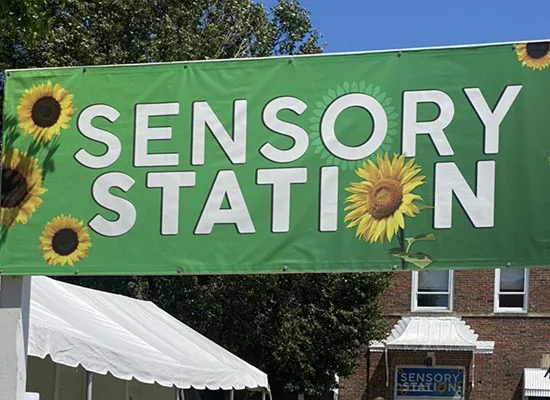
DSCC team members will be at the fair’s Sensory Station on Aug. 7-10 and help during special sensory-friendly Sunflower Hours on Aug. 9
We are excited to once again partner with the Illinois State Fair to support inclusive, accessible fun for families!
The 2025 Illinois State Fair is happening in Springfield from Aug. 7-17.
Our Division of Specialized Care for Children (DSCC) team members will be working at the fair’s Sensory Station. The fair is also offering sensory-friendly Sunflower Hours and other programming to make the fair a more comfortable and enjoyable experience for all.
DSCC at the Sensory Station
Thursday, Aug. 7, to Sunday, Aug. 10
10 a.m. to 7 p.m. daily
Our DSCC team will be at the fair’s Sensory Station from Thursday, Aug. 7, through Sunday, Aug. 10.
The Sensory Station is inside the Emmerson Building, just off Main Street and Brian Raney Avenue in the center of the fairgrounds. It will be open from 10 a.m. to 7 p.m. daily. It is an air-conditioned, dedicated quiet zone with activities and resources to help visitors regroup and refocus.
The Sensory Station’s features and activities include:
- Calming pods
- Noise-canceling headphones
- Foam block pit
- Stuffed animal “petting zoo”
- Coloring station and more!
These tools and activities are for children and adults who need help processing the sights, smells, noises and crowds at the fair.
Nearby, the fair’s First Aid Station has rooms that families can use for adult changing stations as well as tube feedings and other needs. Volunteers from SIU Medicine operate the First Aid Station in the Emmerson Building Annex, across from the Dairy Building on Central Avenue. It is open daily from 11 a.m. to 11 p.m.
Our DSCC team will also have a tent outside the Sensory Station on these four days. We will have coloring activities and information about our programs and services for families. Be sure to stop by and see us!
Sunflower Hours
Saturday, Aug. 9
9 a.m. to 12 p.m.
Enjoy a quieter fair experience during Sunflower Hours on Aug. 9 from 9 a.m. to 12 p.m. During this time, the fair will adjust certain programs and activities to create a more calming environment for children and adults with sensory processing sensitivities.
The fair has Sunflower Hours stickers available for families to use during this timeframe. This sticker allows fair visitors with sensory sensitivities to enjoy select amusement rides for free during the Sunflower Hours. Riders must have the Sunflower Hours sticker and an adult and/or caregiver accompanying them.
DSCC has a limited number of stickers available for our program participants. To request a Sunflower Hours sticker, please email dscc@uic.edu with your name and your participant’s name by Aug. 1.
We will send stickers on a first-come, first-served basis.
All families may visit the Sensory Station during the Sunflower Hours event to get more stickers. The stickers will be available while supplies last.
Conservation World, located at the fairgrounds’ Eighth Street entrance, will also host Sunflower Hours on Aug. 9 and Aug. 12 from 8:30 to 10 a.m. Fairgoers can explore the great outdoors in a more peaceful and sensory-friendly setting during these times.
Social Story and Other Resources
The Illinois State Fair has a social story to help you plan your visit to this year’s event. It is a step-by-step guide to help parents and caregivers explain what to expect during a visit to the Illinois State Fair.
You can find the social story and more details about the Sensory Station, Sunflower Hours, the entertainment schedule and more on the Illinois State Fair website.
We are proud to help support greater accessibility and inclusion at the 2025 Illinois State Fair.
Check out the video below to see more photos and activities at the Sensory Station:
For more information about other sensory-friendly activities and events for children and families throughout Illinois, please visit our Events page and follow us on Facebook.
Webinar Series to Help Families, Caregivers and Youth Navigate the Transition to Adulthood
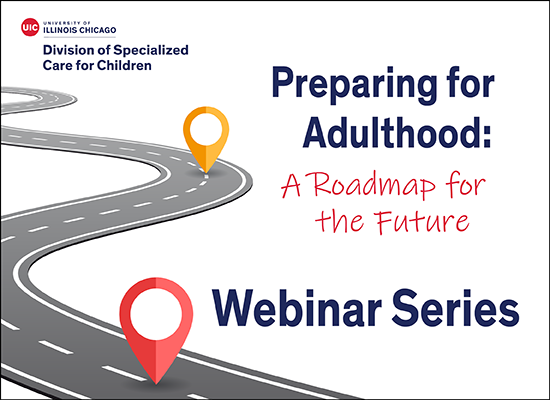
Learn practical strategies and tools to plan for the transition to adulthood during our free two-part series
Families can face new challenges and shifting roles as young people move toward adulthood.
Join the Division of Specialized Care for Children (DSCC) to learn more about navigating this journey during our free “Preparing for Adulthood: A Roadmap for the Future” webinar series.
The two-part series will feature Claire Cook, DSCC Title V Transition Specialist, and Suzanne Aaron, Northern Illinois Outreach Specialist for Illinois Life Span.
The sessions will cover:
- “Session One: Navigating Adult Systems,” June 26 at 6 p.m.
This session is for youth ages 12 to 15 and their families. Families with children at other developmental stages are also welcome to attend.
This session will provide practical tools for exploring and understanding adult systems, such as health care, education, employment and more. It will also cover strategies for balancing independence and guidance as family roles evolve.
- “Session Two: Empowering Parents and Caregivers,” July 31 at 6 p.m.
Session two is for parents, caregivers and families of youth ages 16 and older with complex needs and/or disabilities.
Building on session one, participants will dive deeper into adult guardianship, health insurance, benefits and programs for youth with complex needs. The session will focus on creating meaningful daily routines while managing evolving family dynamics. It will also explore the role of support circles and how to make decisions that support youth and caregivers in the long run.
- “Primera sesión: Recorrer los sistemas de los adultos,” 26 de junio a las 6 p. m.
Esta sesión es para padres, cuidadores, familias y jóvenes de 12 a 15 años. Las familias de jóvenes en otras etapas de desarrollo también son bienvenidas.
- “Segunda sesión: Empoderar a los padres y cuidadores,” 31 de julio a las 6 p.m.
Según la primera sesión, este seminario web se centrará en tutela de adultos, seguro médico, beneficios y programas para jóvenes con necesidades complejas, crear rutinas diarias importantes mientras se maneja la dinámica familiar en evolución y la función de los círculos de apoyo y cómo tomar decisiones que apoyen a los jóvenes y a los cuidadores a largo plazo. Esta sesión ofrecerá a las familias conocimientos y estrategias adaptadas a sus retos únicos.
Each presentation will be in English. Live Spanish interpretation will be available.
The recordings and slides for both sessions will be available on our Family Education Webinars page.
If you have questions about the series, please contact Claire Cook at clairer3@uic.edu or (800) 322-3722.
Please spread the word and plan to join us!
Our New Claims Processing System is Live!

The new system offers faster, more efficient claims processing
Our new, centralized claims and provider management system for the Division of Specialized Care for Children (DSCC) is now live!
This upgrade is part of our continued commitment to improve service delivery and strengthen our partnerships with providers by offering faster, more efficient claims processing.
The new platform offers a new and improved Provider Portal. Please note that the new Provider Portal is not yet available for our Core Program providers.
Here is what each group of providers needs to know:
Core Program Providers
As we launch our new claims processing system, please be aware that our previous Provider Portal is no longer available.
We are currently developing a new and improved Provider Portal for our Core Program-enrolled providers. We expect to launch the new portal in the coming months. For more details, please visit our Provider Portal page.
Home Care Nursing Agencies
Our new claims processing system combines NurseNet and the new Provider Portal into a single, streamlined solution to make managing claims easier and more efficient.
If your agency has not yet completed the Provider Portal Access form, please have a designated representative do so as soon as possible.
Please include all users your agency would like to access NurseNet, the Provider Portal or both. Once you sign the form electronically, it will automatically go to DSCC for review.
For more details about how to register and log in, please visit our Provider Portal page. You will also be able to find resources for using the new Provider Portal, including a tip sheet and how-to videos.
Upcoming NurseNet Planned Maintenance
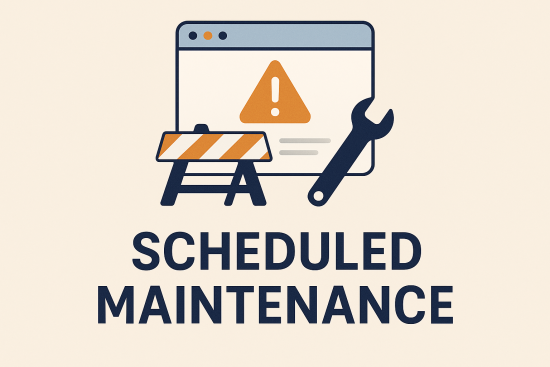
Our NurseNet site will be unavailable during scheduled maintenance from May 1-11
The Division of Specialized Care for Children (DSCC) will implement a new claims processing system in May.
Our Provider Portal, a part of the new system, will improve our claims submission and provider management by integrating with our NurseNet site to consolidate all DSCC tools for providers in one place.
As part of this rollout, NurseNet will be unavailable while we link it with the new Provider Portal.
Maintenance Period
NurseNet will be unavailable during the following period:
- Start date: Thursday, May 1, 2025
- End date: Sunday, May 11, 2025
What Families Need to Know
- During the maintenance, NurseNet will be unavailable.
What Nursing Agencies Need to Know
- During the maintenance, NurseNet will be unavailable.
- The Provider Portal testing site will still be available to test submitting claims.
- Following the launch of the new claims processing system, all DSCC applications, including NurseNet, will exist in the new Provider Portal.
- If you have not yet, you can register for the new Provider Portal at any time. Please see our provider notice from April 18 for instructions.
Thank you for your patience during this downtime.
Our DSCC team is dedicated to completing this process swiftly and effectively so that we can bring you an improved experience.
If you have any questions or concerns about the NurseNet downtime, please email dsccexternalhelp@uic.edu.
Families can also talk to their DSCC Care Coordinator about any needs or issues with their in-home nursing.
We appreciate your partnership and understanding!
Rate Increase for In-Home Nurses Now Approved

HFS has received the necessary federal approval for the Jan. 1, 2025, rate increase to take effect.
We have an important update on the rate increase for in-home nurses originally set to take effect on Jan. 1, 2025.
The Illinois Department of Healthcare and Family Services (HFS) has received the necessary federal approvals for the rate increase to take effect.
You will see the updated rates reflected on your next Prior Authorization for In-Home Shift Nursing letter (also known as the 2352).
The rate increase affects:
- Registered nurse (RN), licensed practical nurse (LPN) and certified nursing assistant (CNA) care
- In-home and facility-based respite care
- Nurse training rates
The increased rates are:
- RN, $57.78 per hour
- LPN, $48.15 per hour
- CNA, $32.10 per hour
You can find the updated rate table on our website’s Home Care Rate Table page.
The Division of Specialized Care for Children (DSCC) will begin paying nursing agencies the newly approved rate when our new CarePay claims software system goes live. We currently expect to launch CarePay in mid-May.
We are communicating with our enrolled home nursing agencies about this update as well.
After we transition to CarePay, DSCC will work with home nursing agencies to adjust payments for nursing services dating back to Jan. 1.
If you have any questions, please reach out to your DSCC Care Coordinator. We are here to help!
Share Your Input and Connect at Our Family Advisory Council Open Forum on May 8
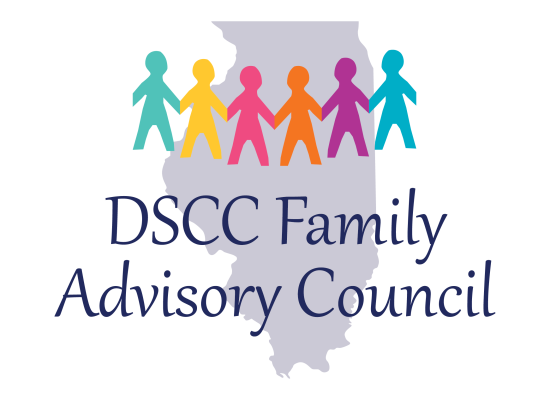
We invite all Illinois families of children with special healthcare needs to share their feedback and experiences at this virtual forum.
Join us for an opportunity to connect with other families and share your feedback on topics that matter to you.
Our next Family Advisory Council (FAC) open forum is on May 8 from 9 to 11 a.m.
This free virtual meeting is for all Illinois families of children with special healthcare needs. You do not have to be a Division of Specialized Care for Children (DSCC) participant to attend.
You can sign up on Zoom to join the meeting. Please note that live Spanish translation will be available during the open forum.
The FAC guides our efforts to strengthen teamwork, improve communication and empower families to have a voice in their children’s care. The council also connects families to resources and other families who are on a similar journey.
Our FAC has also played an important role in developing:
- Our DSCC Family Portal to help families more easily communicate and share information with their DSCC care coordination team
- NurseNet, a digital platform that connects Illinois families needing nursing care with local home health agencies
- “All About Me” Page templates to help providers, care coordination teams, schools and other caregivers understand the likes, strengths and needs of each child beyond their medical diagnosis
- Our free, virtual Health Insurance Education Series to help families navigate the insurance maze and better understand their coverage and benefits
- Improvements to our family survey process, including reducing the number of surveys that families receive
- Updates to our online Resource Directory and more
You can find the minutes from past meetings and more details on our website’s Family Advisory Council page.
You can also visit our Family Stories page to learn about some of the family members who serve on the council:
If you have questions or would like more details on how to participate in the FAC, please email dsccfac@uic.edu.
We hope to see you on May 8!
Meet Our Medical Advisory Board Member Dr. Sarah Sobotka
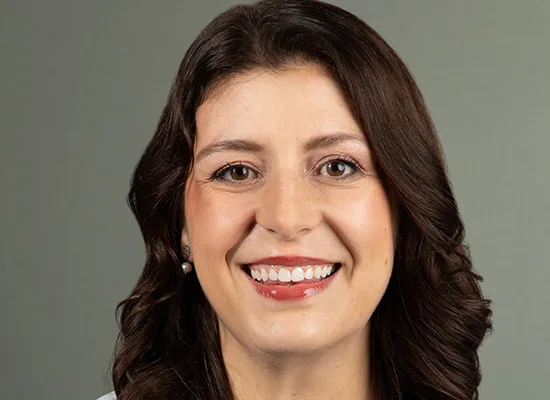
“My hope is that what I bring to DSCC… are the data points that help to drive advocacy and improvements in care.”
Dr. Sarah Sobotka first started working with the Division of Specialized Care for Children (DSCC) through her research to improve support for children with mechanical ventilators and their families.
“I have been working with DSCC as a critical partner in my research program since 2017,” she said, noting how DSCC helped recruit eligible families for her research studies.
“I am so fortunate to have had the enthusiastic support from DSCC because our missions are so aligned and from a research standpoint, it allows me to work with a state agency that lacks the bias of a single hospital center or a single institution… it is a more balanced sample, working with the entire state.”
Sobotka and DSCC share the same goal to better understand the needs of children with medical complexity and connect their families with the right services and support to achieve their best quality of life.
In 2020, DSCC’s leadership invited Sobotka to join our Medical Advisory Board as an expert medical provider.
Her research and expertise provide valuable perspectives on how to best allocate resources and improve systems of care for all Illinois children and youth with special healthcare needs.
An early focus on children with medical complexity leaving the hospital
Sobotka is an Associate Professor of Pediatrics, Section of Developmental and Behavioral Pediatrics, and Ambulatory Medical Director of Comer Developmental and Behavioral Pediatric Programs in the Department of Pediatrics at the University of Chicago.
She became interested in children with medical complexity while completing her residency.
“I did my pediatric residency, and then I elected to do a developmental and behavioral pediatric fellowship in order to focus on the diagnosis and support of children with disabilities and their families,” Sobotka said.
She quickly saw how long children with medical complexity and undiagnosed disability spent in the hospital.
“I recognized early on that an impediment to their flourishing and to their families’ functioning was the length of time they were in the hospital,” she said. “So, some of my early work focused on that process of discharge and the many components that have to get together in order for a child with medical complexity, particularly kids with ventilators, to leave the hospital.”
As part of Dr. Sobotka’s training, she took an additional year between her third and fourth year of medical school to complete a Master of Science for Clinical Professionals. This advanced degree gave her training in epidemiology and research.
Sobotka’s research focus has explored what happens after children with complex medical needs leave the hospital, what the home nursing landscape looks like and what individual families’ experiences and needs are.
One of Dr. Sobotka’s first research studies involved interviewing DSCC Care Coordinators, skilled private duty nurses, and parents of children in the Home Care Program who came home with a ventilator.
“I interviewed those parents a couple of times after going home, so I really started to understand the complexity of home care challenges and what that looked like for families,” she said.
This research project identified gaps in therapy services for these children, and Sobotka developed interventions to support their diverse disabilities. She also learned more about how DSCC Care Coordinators support families and what motivates and challenges professionals in this important role.
Improving the healthcare system’s efficiency
Over the last seven years, Sobotka has continued to partner with DSCC on multiple studies. Recent projects include:
- “Disparities in Home Nursing and Hospital Length of Stay for Children with Invasive Mechanical Ventilation: Identifying National Trends and Piloting a Parent-to-Parent Intervention”
- This study includes a parent-to-parent coaching pilot program for families. This pilot program is for families who have a child on a ventilator in the hospital and are awaiting home nursing so their child can be discharged home or have gone home and do not have enough home nursing support.
- This study includes a parent-to-parent coaching pilot program for families. This pilot program is for families who have a child on a ventilator in the hospital and are awaiting home nursing so their child can be discharged home or have gone home and do not have enough home nursing support.
- “Let’s E.A.T! (Eating with Assistive Technology)”
- This study aims to help children with feeding tubes and tracheostomies (trachs) eat by mouth. It is for families who have a child under 3 years old with a feeding tube and trach.
You can read more about these studies on pages 35 and 36 of our FY 2024 Annual Report.
A major theme in Sobotka’s work is improving the healthcare system’s efficiency so that all children, especially those with medical complexity, spend more time in the least restrictive environment at home with their families.
“This ultimately has the greatest potential to improve their developmental trajectory, because although this is a population at high risk for complex disability, I still believe there are opportunities to mitigate the worst disability outcomes with the right interventions at the right times,” Sobotka said.
Sobotka says families’ experiences and feedback direct the course of her research.
As a Medical Advisory Board member, Sobotka enjoys the opportunity to collaborate with other members to advocate for parent caregivers. She also aims to keep families’ needs and priorities at the center of decisions and improvements in the healthcare system.
“My hope is that what I bring to DSCC and also to other investigators, clinicians, and families are the data points that help to drive advocacy and improvements in care,” she said.
Thank you, Dr. Sobotka, for your dedication to improving the lives of children with complex medical needs and their families!
Annual Illinois Statewide Transition Conference Maps Out Routes to Adulthood
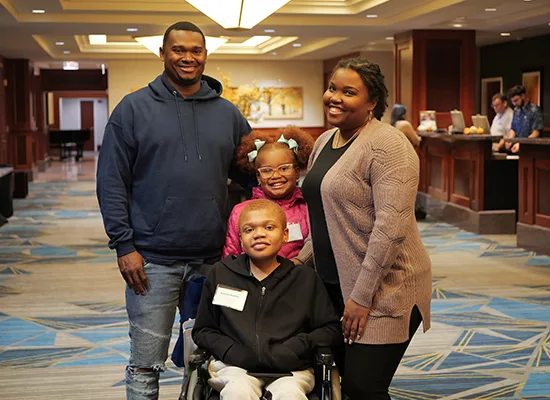
The annual Illinois Statewide Transition Conference provides valuable opportunities and resources to help youth and young adults with disabilities navigate the transition to adulthood.
Turning 18 is a major milestone. For Brenton Braxton and his family, they approached it with a mix of excitement and many questions about the future.
What benefits can Brenton qualify for as an adult? What should they know about guardianship and power of attorney?
Brenton has Duchenne muscular dystrophy, a genetic disorder that causes his muscles to weaken over time.
“When Brenton was first diagnosed when he was 7, these things that are being presented to us now – at that time, we had no idea that we’d be able to be at this place. So, that’s why my word I keep using is a sense of excitement because… Brenton’s still thriving,” his mom, Veneise, said.
Brenton is now a senior in high school with a strong interest in sports and a desire to go to college and “live life to the fullest.”
To help Brenton and his family prepare for what’s next, their Division of Specialized Care for Children (DSCC) Care Coordinator recommended they attend the Illinois Statewide Transition Conference.
The annual event provides valuable resources and information to help youth with disabilities and their families navigate the transition to adulthood.
“One of the major reasons why we wanted to attend this conference is that we wanted to get in the room with the resources. We wanted to get to the people, talk to the people, engage with the people that can say, ‘Hey, here’s what your child qualifies for. Hey, try this program for him, do this, go down this avenue,'” Veneise said.
“You just really want to have your feet grounded in knowing what’s getting ready to happen.”
The Braxtons were among nearly 450 people who attended the 19th Illinois Statewide Transition Conference, titled “Stepping Stones of Transition,” on Nov 7-8, 2024, at the Crowne Plaza Hotel and Convention Center in Springfield.
The transition conference brings together youth with disabilities, parents, caregivers, vocational professionals, healthcare professionals, educators and more.
Youth with disabilities and their families can network and find answers to common questions about the transition to adulthood, including:
- What happens after I leave high school?
- How do I sort through the maze of resources?
- What steps can I take now to prepare for upcoming changes?
- What skills are important for me to develop?
“Here we all are in one space.”
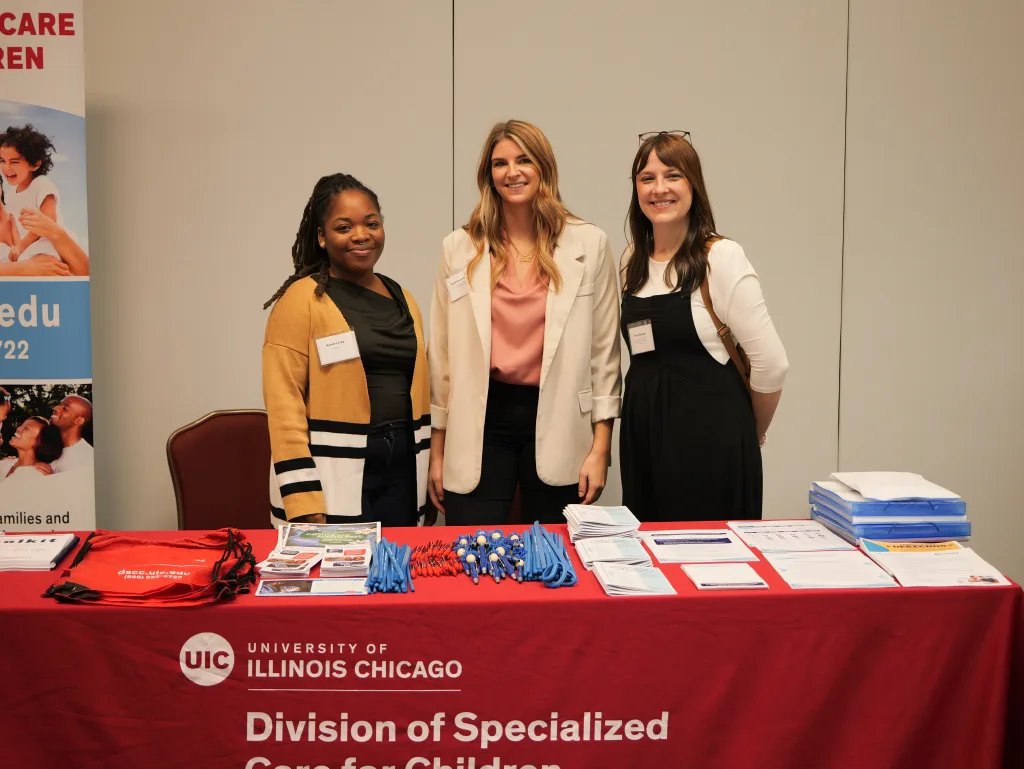
DSCC Home Care Family Outreach Associate Erica Stearns describes the annual conference as “a dream come true.”
Erica is the parent of two children enrolled with DSCC. Erica also has lived experience as an individual with disabilities.
“I was talking to another adult with disabilities before this interview, and it dawned on me, I didn’t grow up having this,” she said.
“To have an event where everyone is coming together for a similar purpose related to our children and their disabilities is incredibly meaningful, and it’s unique in that here we all are in one space.”
Erica highlighted the importance of ensuring youth and young adults have access to the information and resources they need as they transition to adulthood.
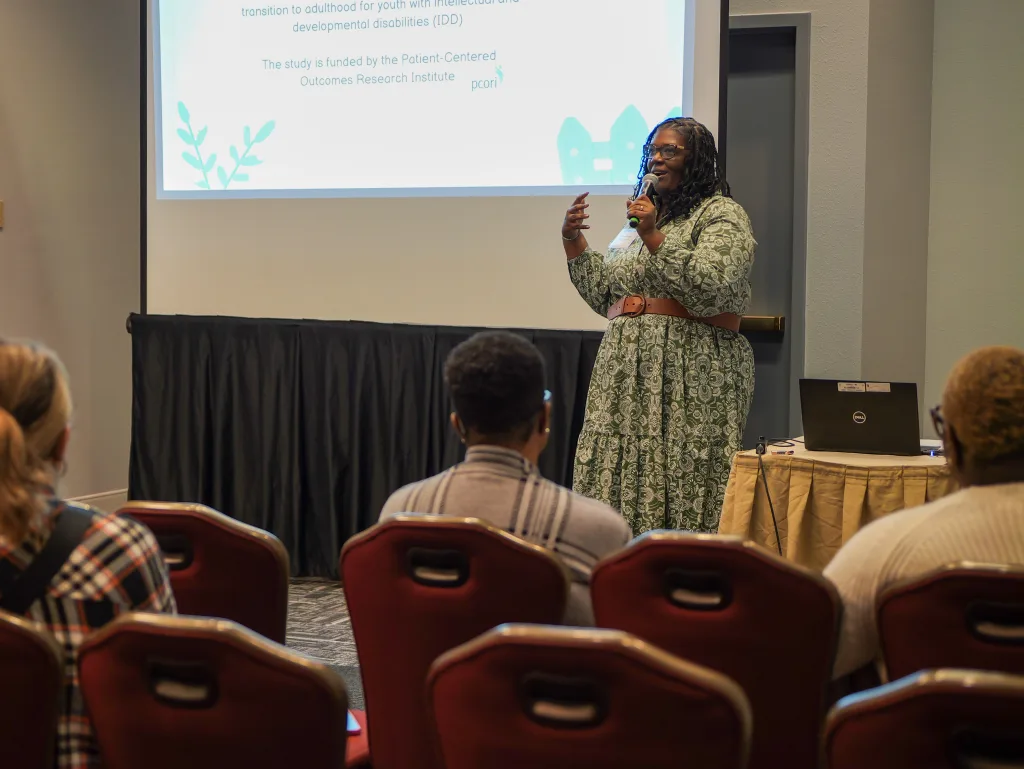
“It is abundantly clear that while we know that there are certain steps and certain paths that individuals with disabilities can take as they navigate their entry into adulthood, the information to prepare both their families and themselves for that is very challenging to find,” she said.
“I think most families feel empowered with knowledge. And I think that’s what this conference provides families is information, knowledge, tools and resources.”
DSCC helps sponsor the conference and serves on its steering committee. DSCC also provides financial support to help participant families attend the conference.
Claire Cook is DSCC’s Title V Transition Specialist and co-chair of the Transition Conference’s Steering Committee.
“Several families came back from last year,” said Claire. “We had about 20 or so individual families from DSCC, five of which were primarily Spanish speaking and several of our transition-age youth.”
“A lot of opportunities, a lot of information.”
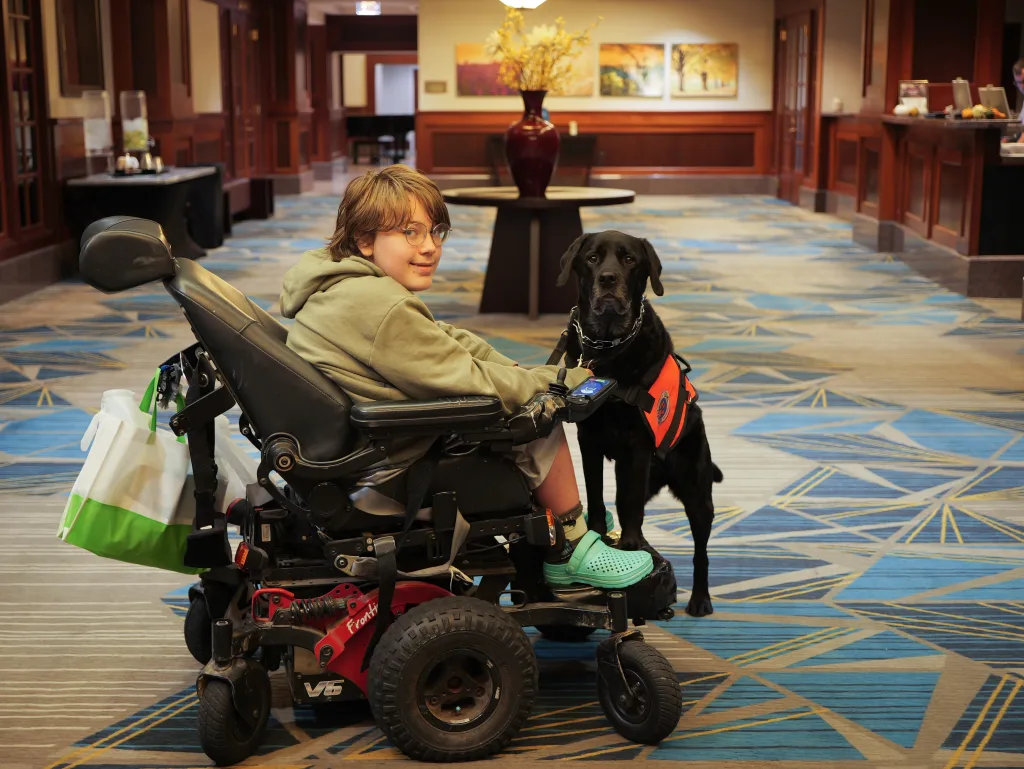
Jani, 14, attended the conference with his mom, Aimee, and sister, Grace.
Jani has spinal muscular atrophy (SMA). He first enrolled with DSCC when he was diagnosed with SMA, close to 12 years ago.
Jani described the conference as a positive experience with valuable information. He and his family gained resources, discovered new opportunities and made connections.
“We had a very nice family that was sitting by us (at lunch), whose son had a similar disability. It was just nice to talk to them and hear their story,” Jani said.
When asked if he would recommend the conference to other young adults, he said, “You should definitely come because it has a lot of opportunities, a lot of information. It’s just good to come to understand what’s going to happen, what they want to do later in life.”
After high school, Jani plans to go to college and become a teacher.
“I want her to be strong, and I want her to be confident.”
TaLeah, 17, attended the conference with her mom, Tamara. TaLeah first enrolled with DSCC 15 years ago, when she was diagnosed with hearing loss.
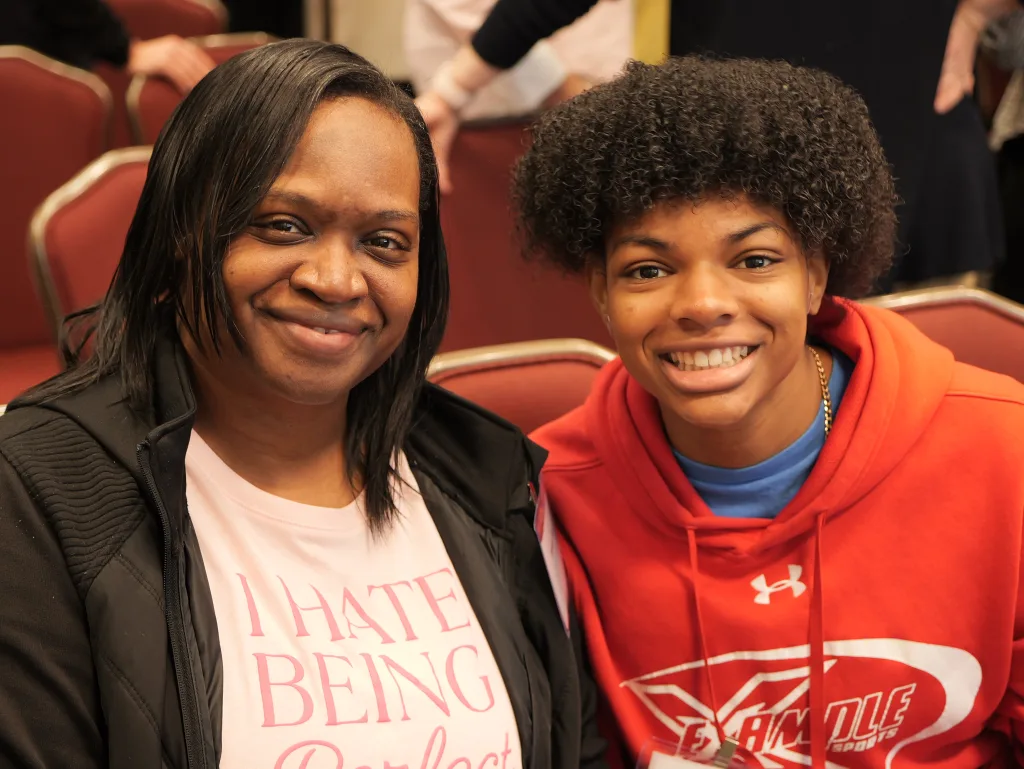
She is an accomplished basketball player who plans to go to college, play basketball and be successful.
“I want her to be strong, and I want her to be confident,” said Tamara.
“I want her to continue to advocate for herself and others. And I think she’s doing a good job thus far.”
Tamara said she is trying to give her daughter the best tools and equip her the best way she knows how.
“All this information is very helpful and hopefully it’ll help build her up.”
Brenton Braxton said the resources and knowledge his family gained at the conference will help him achieve his goals.
“I think some things from here that I learned is that not only I’ll still have my independence, but I can also use my parents to help me in my journey and to living it to the fullest and doing all the things I want to do,” he said.
On turning 18, he said, “It’s a big step, but I feel like with the support from my family and people around me, it’ll be good.”
Save the Date for the 2025 Transition Conference
The 2025 Illinois Statewide Transition Conference will take place Oct. 30-31 at the Crowne Plaza Hotel and Convention Center in Springfield.
To learn more about how to support youth with special healthcare needs during the transition to adulthood, contact DSCC at (800) 322-3722 or dscc@uic.edu.
For more information about the Transition Conference, visit www.illinoistransitionconference.org/.
Check out our Facebook page to see a photo album with more photos from the 2024 Transition Conference.
Resources to Become a Certified Nursing Assistant
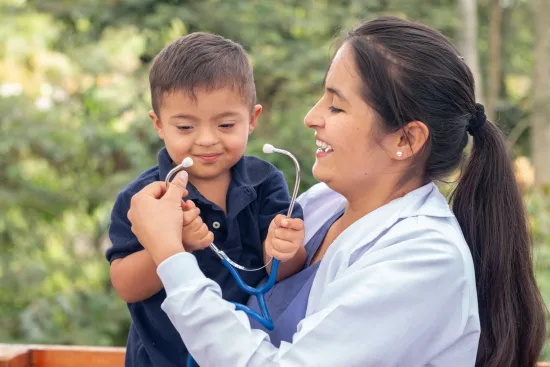
We developed a tip sheet to help guide parents and caregivers through the steps to become a CNA.
We continue to wait for approval to allow parents/legally responsible adults (LRAs) to become paid caregivers if they are a certified nursing assistant (CNA) and employed by a nursing agency.
We understand that our participant families are eager for this change to take effect. Allowing parents and caregivers who are CNAs to become paid caregivers is an important step in strengthening support for families of individuals who need in-home shift nursing.
To help families prepare as we await approval, we’ve put together a Certified Nursing Assistant Resources Tip Sheet.
This tip sheet aims to guide parents and caregivers through the steps to become a CNA. It links to several websites for your convenience and provides general guidelines.
You can also find the CNA Resources Tip Sheet on our Home Care Nursing Information for Families page.
Our Family Advisory Council reviewed this tip sheet to make sure it’s as helpful for families as possible.
Please remember that currently, parents/LRAs can only be paid for providing skilled nursing services to their children if they hold an active registered nurse (RN) or licensed practical nurse (LPN) license. This rule applies to parents/LRAs of all children approved for Home Care Program services, regardless of the child’s age.
The plan to allow CNAs as paid family caregivers requires an amendment to the Medicaid Home and Community-Based Services Waiver for Those Who Are Medically Fragile, Technology Dependent (MFTD waiver). It also requires the creation of a new state plan amendment. Both approvals must be in place to allow for this change.
There is currently no set timeline for the state plan amendment and the MFTD waiver amendment to be approved.
Once approved, we will notify you as quickly as possible.
If you have any questions, please contact your DSCC Care Coordinator at (800) 322-3722.
Free Family Webinar Series Focuses on Medicaid Waivers
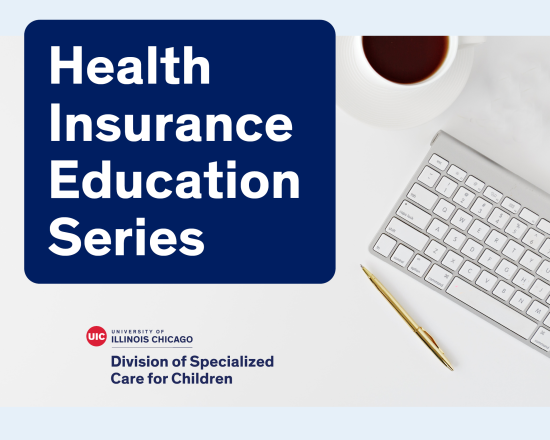
Learn more about the MFTD, DRS and DDD Medicaid waivers and how they can help your family
Our annual Health Insurance Education Series returns in March to help families understand important health insurance topics.
In response to family feedback, our 2025 series will explain Medicaid Home and Community-Based Services Waiver Programs for Illinois.
The webinars are open to Division of Specialized Care for Children (DSCC) participants, their family members and anyone interested in these topics.
These free virtual trainings will feature DSCC team members and other presenters covering a different waiver each month:
- Medically Fragile and Technology Dependent (MFTD) Medicaid Waiver, March 11 at 6 p.m.
- The March presentation will focus on the Medically Fragile and Technology Dependent Waiver for children and adults. Presenters from DSCC will explain how to apply, who is eligible, what benefits are available, and how to use the benefits.
- See the MFTD Medicaid Waiver flyer
- Register on Zoom for MFTD Medicaid Waiver
- The March presentation will focus on the Medically Fragile and Technology Dependent Waiver for children and adults. Presenters from DSCC will explain how to apply, who is eligible, what benefits are available, and how to use the benefits.
- Division of Rehabilitation Services (DRS) Medicaid Waivers, April 8 at 6 p.m.
- The April presentation will focus on the different waivers available for children and young adults through the Division of Rehabilitation Services (DRS). Presenters from DRS will explain how to apply, who is eligible, what benefits are available, and how to use the benefits.
- See the DRS Medicaid Waivers flyer
- Register on Zoom for DRS Medicaid Waivers
- The April presentation will focus on the different waivers available for children and young adults through the Division of Rehabilitation Services (DRS). Presenters from DRS will explain how to apply, who is eligible, what benefits are available, and how to use the benefits.
- Division of Developmental Disabilities (DDD) Medicaid Waivers, May 13 at 6 p.m.
- The May presentation will focus on the different waivers for children and young adults available through the Division of Developmental Disabilities (DDD). Presenters from DDD will explain how to apply, who is eligible, what benefits are available, and how to use the benefits.
- See the DDD Medicaid Waivers flyer
- Register on Zoom for DDD Medicaid Waivers
- The May presentation will focus on the different waivers for children and young adults available through the Division of Developmental Disabilities (DDD). Presenters from DDD will explain how to apply, who is eligible, what benefits are available, and how to use the benefits.
- La Excepción de Medicaid para personas médicamente frágiles y dependientes de la tecnología (MFTD), 11 de marzo, a las 6 p.m.
- La presentación de marzo se centrará en la excepción para personas médicamente frágiles y dependientes de la tecnología para niños y adultos. Los presentadores de la División de Atención Especializada para Niños (DSCC) le explicarán cómo presentar la solicitud, quién es elegible, qué beneficios están disponibles y cómo utilizarlos.
- Consulte el folleto de Beneficios de MFTD para obtener más detalles.
- Registrarse para MFTD en Zoom.
- La presentación de marzo se centrará en la excepción para personas médicamente frágiles y dependientes de la tecnología para niños y adultos. Los presentadores de la División de Atención Especializada para Niños (DSCC) le explicarán cómo presentar la solicitud, quién es elegible, qué beneficios están disponibles y cómo utilizarlos.
- Excepciones de Medicaid de la División de Servicios de Rehabilitación (DRS), 8 de abril a las 6 p.m.
- La presentación de abril se centrará en las diferentes excepciones disponibles para niños y adultos jóvenes a través de la División de Servicios de Rehabilitación (DRS). Los presentadores de DRS explicarán cómo presentar la solicitud, quién es elegible, qué beneficios están disponibles y cómo utilizarlos.
- Consulte el folleto de Excepciones de Medicaid de la DRS para obtener más detalles.
- Registrarse para Excepciones de Medicaid de la DRS en Zoom.
- La presentación de abril se centrará en las diferentes excepciones disponibles para niños y adultos jóvenes a través de la División de Servicios de Rehabilitación (DRS). Los presentadores de DRS explicarán cómo presentar la solicitud, quién es elegible, qué beneficios están disponibles y cómo utilizarlos.
- Excepciones de Medicaid de la División de Discapacidades del Desarrollo (DDD), 13 de mayo a las 6 p.m.
- La presentación de mayo se centrará en las diferentes excepciones para niños y adultos jóvenes disponibles a través de la División de Discapacidades del Desarrollo (DDD). Los presentadores de DDD explicarán cómo presentar la solicitud, quién es elegible, qué beneficios están disponibles y cómo utilizarlos.
- Consulte el folleto de Excepciones de Medicaid de la DDD para obtener más detalles.
- Registrarse para Excepciones de Medicaid de la DDD en Zoom.
- La presentación de mayo se centrará en las diferentes excepciones para niños y adultos jóvenes disponibles a través de la División de Discapacidades del Desarrollo (DDD). Los presentadores de DDD explicarán cómo presentar la solicitud, quién es elegible, qué beneficios están disponibles y cómo utilizarlos.
You can also:
- Download a flyer with all Health Insurance Education Series topics and registration links. (The flyer is also available in Spanish.)
- See details about each series session on our Events page.
- Watch the session recordings and access related materials anytime on our Family Education Webinars page.
Our Health Insurance Education Series began in response to questions and suggestions from our Family Advisory Council.
If you have questions about these webinars before or after a session, please email dscc@uic.edu or call (800) 322-3722.


